
Figuring out whether a tattoo parlor is certified in California can be tricky, considering all the regulations and rules that come into play. This post will help you make sense of the complexities associated with determining if a tattoo shop is licensed in California.
We will delve into the Safe Body Art Act of 2011, which outlines registration requirements for body art practitioners and emphasizes on Blood-Borne Pathogens Exposure Control Training. It’s crucial knowledge when assessing your chosen tattoo artist or studio.
The article also covers key business compliance factors like public health permits and premises standards that ensure sanitation at tattoo parlors. We’ll explore legal obligations towards clients including age restrictions for tattoos or piercings, and post-procedure responsibilities such as providing care instructions.
Moreover, we’ll discuss specific regulations within Los Angeles County like guidelines for constructing spaces into body art facilities and permit requirements for temporary events or mobile services. Finally, navigating through state regulations might seem daunting but don’t worry; we have resources available to help you verify if a tattoo shop is licensed in California.
Table of Contents:
- Understanding the Safe Body Art Act of 2011
- Checking Business Compliance and Premises Standards
- Legal Obligations Towards Clients
- Specific Regulations in Los Angeles County
- Navigating State Regulations & Available Resources
- FAQs in Relation to How to Known if a Tattoo Shop is Licensed in California
- Conclusion
Understanding the Safe Body Art Act of 2011
The Safe Body Art Act of 2011 is a crucial piece of legislation that regulates tattoo shops in California, including Remington Tattoo Parlor. It’s important for all body art practitioners to grasp and follow this law.
Registration requirements for body art practitioners
All artists must register with their local enforcement agency. This involves completing an approved course in Blood-Borne Pathogens Exposure Control Training and paying a $54 registration fee annually. These rules ensure that every artist at our North Park neighborhood shop is fully trained and registered.
Importance of Blood-Borne Pathogens Exposure Control Training
This training provides vital knowledge on preventing exposure to blood-borne pathogens during procedures, ensuring safety for both the client and the practitioner. At Remington Tattoo Parlor, we prioritize safety by ensuring all our artists complete this necessary training before they start working on clients.
Checking Business Compliance and Premises Standards
If you’re thinking of getting inked at Remington Tattoo Parlor, rest assured they play by the rules. They’ve got a legit business license, follow zoning codes, and even register their fancy fake names.
Key factors to consider for business compliance
- A document granted by the San Diego municipality confirming an enterprise’s legality.
- The shop should be in a zone where tattoo parlors are allowed.
- All fictitious or “doing business as” (DBA) names must be registered with the county clerk’s office.
But that’s not all. Remington Tattoo Parlor takes cleanliness seriously. Their premises go through regular inspections to ensure they’re squeaky clean for your tattoo adventures.
How tattoo parlors maintain sanitation standards
At our tattoo shop, we follow California’s Safe Body Art Act like it’s our tattoo bible. We sterilize like pros, use single-use needles and ink pots, keep our workstations spotless, and get regular health department inspections. If you want to dive deeper into the hygiene practices of body art establishments, check out the Los Angeles County Public Health Department guide on body art establishments’ hygiene practices.
Legal Obligations Towards Clients
In California, tattoo shops have a legal duty to their clients. No ink for the underage, even with parental consent. California law keeps the kiddos safe.
Age restrictions for tattoos and piercings
Body art rules in California dictate which body parts can be pierced based on age. Check out this helpful body art regulation guide by CDPH.
Post-procedure responsibilities: care instructions
At Remington Tattoo Parlor, our artists make sure to give clear aftercare instructions and explain any potential risks involved with your new body art.
Specific Regulations in Los Angeles County
If you’re in LA County, you gotta follow some extra rules. Wanna turn a space into a body art facility? Get the nod from the health officers first. They’ve got construction and renovation guidelines to keep things safe and clean.
Guidelines for Constructing/Renovating Spaces into Body Art Facilities
Building a body art facility involves a bunch of steps. Submit plans, pay fees, and pass inspections. Comply with the regulations like a specialist to stay in line with the law.
Permit Requirements for Temporary Events or Mobile Services
Even temporary events and mobile services need permits. Whether it’s a tattoo expo or our cool Remington Tattoo Parlor van in San Diego, everyone’s gotta play by the state’s rules.
Navigating State Regulations & Available Resources
Don’t freak out about California’s tattoo shop rules – the California State Regulations for Body Art can help you make sense of it all.
Aspiring creatives can gain the instruction and assistance they need to flourish in this highly-governed sector through the Artist Accelerator Program.
Stay ahead of the game by renewing your certifications annually, paying fees promptly, and keeping up to date with your Hepatitis B vaccine status.
- Certification Renewal: Don’t forget to renew your certificates every year.
- Fees: Be ready to cough up the cash for any required renewal fees.
- Hepatitis B Vaccine Status: Keep track of your vaccination records – they might need a booster shot.
By following these steps, you’ll stay within the law and provide safe services for clients at places like Remington Tattoo Parlor in San Diego, California.
FAQs in Relation to How to Known if a Tattoo Shop is Licensed in California
Are California tattoo shops regulated? Yes, all tattoo shops in California are strictly regulated under the Safe Body Art Act.
Do you need a license to tattoo in California? Yes, it’s mandatory for practitioners to have an annual registration from their local health department.
Is it illegal to tattoo someone without a license in California? Absolutely, tattooing without proper licensing is considered illegal and punishable by law.
What is the rule for tattoos in California? The main rule is that individuals must be 18 years or older to get a tattoo in California, regardless of parental consent.
Conclusion
When it comes to getting a tattoo in California, don’t be a rebel without a cause – make sure the tattoo shop is licensed and following the rules.
Know the Safe Body Art Act of 2011 and check for business compliance and premises standards – because you don’t want your tattoo experience to be a permanent regret.
If you’re in Los Angeles County or planning to hit up temporary events or mobile services, there might be even more guidelines and permit requirements to consider – it’s like a tattoo treasure hunt!
Don’t be clueless – educate yourself on licensing procedures and use reliable resources to get all the info you need – because knowledge is power, especially when it comes to getting inked!

